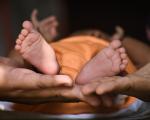Religious Surgery and Children’s Rights
Female genital mutilation (FGM)
Female genital mutilation (FGM) has been illegal in the UK since 1985 and the law was updated in 2003. Despite this, some British girls of Muslim parents are still being sent back to the countries of their parents' origin for this abusive procedure to be done. And, many believe it is even performed secretly in this country. We therefore question why there has not been a single successful prosecution since the practise became illegal. We are concerned that fear of upsetting cultural and religious sensitivities prevents such abuse and bodily harm from being tackled effectively.
Circumcision
All children deserve equal protection under the law, regardless of their gender, and the UK is obliged to ensure non-discriminatory application of its law under Article 14 of the European Convention on Human Rights.Given that female infants are protected from all forms of genital cutting in the Female Genital Mutilation Act 2003, there can be little argument that the same protection ought to be extended to male children.
The principle behind FGM ban was the protection of girls from any form of genital cutting, no matter how slight or what the cultural background of the parent. There is no legitimate basis for denying such protection to boys.
Circumcision is far from risk-free and affects a significant minority of infants. Scarring, infections, pain on urinating and psychosexual difficulties are not uncommon results of ritual childhood circumcision. In one hospital alone in 2011, 11 baby boys needed to be admitted to the hospital's paediatric intensive care unit with serious, life-threatening complications following circumcision. In February 2012, a baby boy died in North London as a direct result of bleeding complications two days after a ritual circumcision.
A statement of the Royal Dutch Medical Association produced along with seven other Dutch scientific associations including the GPs, paediatric surgeons, paediatricians and urologists concluded that the procedure can be harmful and that it violates the boy's human rights to autonomy and physical integrity.
This position was mirrored by the recent German court ruling which found that non-therapeutic circumcision of male children amounts to bodily injury, and is therefore a criminal offence.
We welcome the development that the lawfulness of child circumcision is being increasingly questioned and that medical opinion in a number of countries is similarly turning against the historic carte blanche afforded to infant circumcision on the basis that the parents' freedom of religion is the only consideration. Instead, it is now being recognised more widely that this non-therapeutic procedure for which there are numerous complications, some of which are very serious, is a breach of children's rights.
We reject the claim that a parent's right to religious freedom, entitles them to decide for themselves whether they wish to have this intervention carried out. Denying parents any entitlement to make such a decision does not constitute any limitation of the parents' right to manifest their religion; the child has rights too, not only to religious freedom, but also to the right to physical integrity. This invasive surgery is non-consensual, non-therapeutic, irreversible, unnecessary and not without risk. We argue that It should be postponed until the boy is old enough to give (or withhold) informed consent.
Find out more
 | NSS address urges UN to call for government action on human rightsPosted: Thu, 14 Mar 2024 10:26 Religious privilege is undermining rights of UK citizens, NSS tells UN committee. |
 | Protect human rights from religious imposition, NSS urges UNPosted: Fri, 9 Feb 2024 13:38 NSS tells UN Human Rights Committee religious privilege is undermining rights in education, healthcare and around free speech. |
 | Religion should not be a roadblock to child safeguarding in healthcarePosted: Tue, 2 Jan 2024 12:38 A new paper highlights barriers to reforming guidance on non-therapeutic circumcision. The author, Dr Antony Lempert, explains why religion is one of the biggest barriers of all. |
 | NSS defend mayor ousted for questioning religious circumcisionPosted: Thu, 15 Jun 2023 11:19 The National Secular Society has teamed up with a men's health charity to raise concerns after a mayor was ousted for criticising religious circumcision. In a 2008 blog, former mayor of Neyland town council Andrew Lye questioned why religious circumcision of children was necessary if God "made man in his own image". At a meeting earlier this month, fellow councillor Brian Rothero said the remarks were "nothing short of antisemitic and anti-Muslim". The council subsequently voted to remove Lye from the mayoralty and Lye has now resigned from the council. In a joint letter sent to Neyland town council yesterday, the NSS and 15 Square criticised the allegations against Lye as "baseless" and said they would have a chilling effect on free expression. 15 Square is a registered charity which supports men dealing with the physical and psychological problems arising from circumcision. "In a free and open society, religious beliefs and practices must remain open to scrutiny and debate. Individuals should be afforded respect and protection, but ideas should not", the letter said. The letter also pointed out that circumcision has been listed as a "harmful" practice by the United Nations. In 2015 a British judge described it as "more invasive" than some forms of female genital mutilation and held that it met the definition of "significant harm" under the Children Act 1989. Three boys have bled to death in recent years post-circumcision in the UK (Celian Noumbiwe, Angelo Ofori-Mintah, and Goodluck Caubergs) and 11 were admitted in just one year to just one hospital with life-threatening haemorrhage or sepsis. An NHS whistleblower, himself a paediatric surgeon, said in 2016 circumcisions were leaving children "maimed for life". A Freedom of Information Request to the General Medical Council last year revealed complications of circumcision recorded between 2012 and 2022 included penile deformity, infection, urinary complications and inadequate anaesthesia. Babies required blood transfusions in some cases. A 2018 YouGov poll showed 62% of the British public would support a law against non-medical circumcision of boys. NSS: "Andrew Lye spoke up in defence of the bodily integrity and autonomy of children" NSS campaigns officer Dr Alejandro Sanchez said: "In 2016, the UN Committee on the Rights of the Child urged the government to ensure 'no one is subjected to unnecessary medical or surgical treatment during infancy or childhood'. "Religious infant circumcision is exactly that: unnecessary, painful and risky surgery on non-consenting children to satisfy religious or cultural beliefs of their parents. Allegations of antisemitism or Islamophobia cannot be allowed to silence legitimate criticism of harmful religious practices. "Andrew Lye has been ousted from the mayoralty because he spoke up in defence of the bodily integrity and autonomy of children. This will now have a chilling effect on anyone in politics wanting to speak out for children's fundamental rights." Image by Thorsten Frenzel from Pixabay |
 | NSS speaks out at pro-genital autonomy eventPosted: Wed, 10 May 2023 11:48 The National Secular Society has called for an end to all forms of non-consensual religious genital cutting at the Worldwide Day of Genital Autonomy. In a speech on Sunday, NSS campaigns officer Dr Alejandro Sanchez urged the government to "ensure that no one is subjected to unnecessary medical or surgical treatment during childhood", as recommended by the UN Committee on the Rights of the Child. The "bodily integrity, autonomy and self-determination" of children must be protected, he added. The Worldwide Day of Genital Autonomy (WWDOGA) is held in Cologne each year to commemorate the verdict of a local court in 2012, which held that non-therapeutic circumcision of boys constituted grievous bodily harm and was illegal under German law. The court ruled that the "fundamental right of the child to bodily integrity outweighed the fundamental rights of the parents". Waiting until the child was capable of making their own decision about circumcision did not compromise the religious freedom of parents, it added. Then-chancellor Angela Merkel said the decision to protect the bodily integrity of children risked Germany becoming "a laughing stock". The German parliament subsequently brought in new legislation to legalise circumcision. Other groups represented at this year's WWDOGA included Terre de Femmes, an anti female genital mutilation organisation, and 15 Square, a support group for men affected by circumcision. Religious genital cutting in the UK Female genital mutilation (FGM) is illegal in the United Kingdom under the FGM Act 2003. This includes FGM performed for religious reasons. Non-therapeutic circumcision, by contrast, continues to enjoy a presumed exemption to the law against wounding. Three baby boys, Celian Noumbiwe, Angelo Ofori-Mintah, and Goodluck Caubergs, have bled to death post-circumcision in recent years. Eleven were admitted to Birmingham Children's Hospital in just one year with life threatening haemorrhage, shock or sepsis following circumcision. An NSS investigation last year revealed circumcisions were leaving children with deformed penises and babies requiring emergency blood transfusions. In 2015, an English judge held that male circumcision is "more invasive" than some forms of FGM. The practice constituted "significant harm" under the Children Act 1989, he said. But, because it had a "basis in religion" and "health benefits", it fell within "reasonable parenting". The NHS does not recommend non-therapeutic circumcision of boys and lists "permanent reduction in sensation in the head of the penis, particularly during sex" as a complication. NSS: 'Religious genital cutting flies in the face of medical ethics and child rights' Dr Sanchez said: "Subjecting a non-consenting child to a painful, dangerous and irreversible procedure to satisfy the religious wishes of parents flies in the face of medical ethics and child rights. "The medical establishment and the government must now act, as they have done with FGM, to protect boys from medically unnecessary religious and cultural genital cutting." |
 | Boys face serious complications from circumcision, complaints showPosted: Thu, 19 Jan 2023 13:25 Dozens of children are suffering life-threatening, painful and permanent complications from religious circumcisions performed by doctors, the National Secular Society can reveal. The General Medical Council (GMC), which regulates doctors in the UK, dealt with 39 complaints relating to 30 doctors regarding circumcisions between 2012 and 2022, according to information seen by the NSS in a Freedom of Information disclosure. The complaints include incidents in which children's penises were left deformed and babies required blood transfusions. Many of the circumcisions on babies and children are thought to have been performed for religious and cultural reasons only and were not medically necessary. Babies and children suffer pain, bleeding and deformity Many complaints to the GMC referred to circumcisions which led to excessive bleeding, sometimes requiring hospitalisation and blood transfusions. One doctor's "substandard" circumcision resulted in "urinary complications" and "physical deformity" to the child's penis. Another complaint said a botched circumcision required a child to undergo further surgery. In another, a baby needed "specialist intervention" to repair his penis. In one case a doctor reportedly used "inappropriate restraint techniques", including "using non clinical staff to restrain child patients". The Royal College of Nursing has told the NSS restrictive physical interventions should not be used in non-therapeutic circumstances that are either not an emergency or urgent. Some complaints referred to patients suffering "excessive pain" or a lack of adequate pain relief. Other complaints involved doctors using unsterile equipment, and several said patients suffered infections after being circumcised. One baby reportedly suffered bad burns from a heater or lamp in the room during the procedure. Some complaints referred to multiple circumcisions performed by the same doctor. The allegations against one doctor related to eight children. The GMC provided the names of two doctors subject to the complaints who had been struck off after botching circumcisions. In 2013 a baby was admitted to hospital after being circumcised by Sam Neriman at his "dedicated Circumcision Clinic" in London. A fitness to practise panel found Neriman failed to stop the baby's bleeding effectively before discharging him. In 2015 Muhamad Siddiqui was struck off following complaints made about four circumcisions he performed on infants as part of his "Mobile Children's Circumcision Service". His repeated failings included performing the procedure in unhygienic conditions and without proper health checks or emergency medical equipment. In one case, he failed to recognise a baby was having a seizure resulting from a local anaesthetic and therefore did not act immediately to ensure an ambulance was called. In another, he did not check whether the local anaesthetic was working when the baby screamed during the procedure, and continued to cut his foreskin regardless. Siddiqui is facing prosecution on 39 charges, including actual bodily harm. A previous NSS Freedom of Information request revealed eleven boys had been admitted to one hospital in 2011 alone with life threatening haemorrhage or sepsis following circumcision. The NSS's findings echo concerns raised in 2014 by NHS paediatric surgeon Shiban Ahmed. He claimed some circumcisions in the UK were "barbaric and amateurish" and had resulted in "children [being] maimed for life". Although proponents of circumcision claim the procedure is safe, the Medical Protection Society, an insurance company for doctors, states it carries "considerable risks and complications". Many circumcisions 'medically unnecessary' The GMC does not collect data on which circumcisions are performed for medical reasons, and which are performed for religious or cultural reasons only, with no medical need. But several of the complaints specify the circumcisions were "religious" or performed at home. Circumcisions would only be performed at home if they were requested for religious or cultural reasons. Furthermore, the NSS said it is likely many, if not most, of the circumcisions performed on babies and young children were carried out for religious and cultural reasons, rather than out of medical necessity. This is because there is only one medical condition, pathological phimosis, that categorically requires circumcision. This condition is "unusual before five years of age" according to circumcision guidance from the Royal College of Surgeons of England. Ritual circumcisions on boys are most common among Jewish, Muslim and some African Christian communities, where they are often considered a religious obligation. Complaints filed with the GMC only relate to circumcisions performed by qualified doctors. Many religious and cultural circumcisions in the UK are performed by people without medical qualifications and so are neither regulated nor recorded. All forms of ritual genital cutting on girls are prohibited in the UK by anti-FGM (female genital mutilation) laws. But religious and cultural circumcision on male babies and children is permitted, including by non-doctors. In 2015 the High Court ruled that nontherapeutic male circumcision, no matter how competently performed, constitutes "significant harm". The High Court further concluded that to claim male circumcision is less invasive or harmful than some forms of FGM would be "irrational". In a 2018 YouGov survey, 62% of people in the UK said they would support a law prohibiting the circumcision of children for non-medical reasons. NSS: 'Protect boys from religious genital cutting' NSS campaigns officer Dr Alejandro Sanchez said: "These complaints lay bare the dangers of medically unnecessary circumcision in babies and children. It is a myth that circumcision is simple and safe. "Subjecting a non-consenting child to a painful, dangerous and irreversible procedure to satisfy the religious wishes of parents flies in the face of medical ethics and child rights. "These findings are almost certainly the tip of the iceberg. They are only the complaints brought against medically trained professionals. The harms caused by non-medically trained individuals, who under the law can also carry out circumcision, hardly bear thinking about. "The medical establishment and the government must now act, as they have done with FGM, to protect boys from medically unnecessary religious and cultural genital cutting." |
 | Our health system is failing to protect children from ritual circumcisionPosted: Wed, 2 Nov 2022 09:23 While UK medical bodies tie themselves in knots on ritual male infant circumcision, untold numbers of boys are being subjected to a painful, risky and irreversible procedure, says Dr Alejandro Sanchez. In 2008, the Chief Medical Officer for Scotland wrote to health executives informing them that ritual circumcision was to be provided on the NHS. "[I]n the interest of the wellbeing of the child", he wrote, the procedure would be carried out under general anaesthetic by a paediatric surgeon in one of four specialist paediatric centres. Hospital guidelines added "doctors agree that a surgical circumcision should always be carried out under a general anaesthetic. This is safer and less painful for your child". In September, the NSS sought clarification from the Chief Medical Officer: what were the implications of these rigorous strictures for religious circumcisions performed outside of the NHS? The CMO would not be drawn. In the face of inconvenient questions regarding ritual circumcision, such intellectual and ethical contortion is all too common. UK medical bodies maintain that children subjected to ritual circumcision in clinical settings must be 'protected' by strict safeguards. Those circumcised in the community, however, are on their own. We should, of course, be gravely concerned that ritual male circumcision is permitted on medical premises at all. The practice is non-consensual; not medically indicated; constitutes 'significant harm' under the Children Act 1989 and is deferrable until the age of consent. The notion that Female Genital Mutilation (FGM) would be permissible if carried out in an operating theatre is, naturally, repellent. Medicalised ritual circumcision deserves equal disapprobation and contempt. The physical harm of ritual circumcision is now incontrovertible: eleven boys were admitted to Birmingham Children's Hospital in just one year with life threatening haemorrhage, shock or sepsis post-circumcision. Three baby boys, Celian Noumbiwe, Angelo Ofori-Mintah, and Goodluck Caubergs, have bled to death post-circumcision in recent years. And the evidence of psychological impacts is also growing. British Medical Association (BMA) Nonetheless, UK medical bodies have set out their stalls on circumcision. The British Medical Association's 2019 guidance advises that circumcision can be used to treat medical conditions such as pathological phimosis (overly tight foreskin) but only when less invasive measures such as steroid creams or stretching would prove ineffective. To act otherwise would be "unethical and inappropriate." This, by itself, would be sound clinical and ethical advice. The BMA, however, provides one caveat: an otherwise "unethical and inappropriate" circumcision may proceed if there are "relevant social and cultural interests". Thus, the circumcision is somehow morally transformed by the coincidence of the parents' religion. Such doublethink is beneath the BMA and represents a dereliction of duty. All children, including those born to Jewish or Muslim parents, deserve equal protection from ritual circumcision. If, upon reaching the age of consent, that child still wishes to undergo the procedure, that remains their prerogative. Care Quality Commission (CQC) Let us turn now to the mental gymnastics of the Care Quality Commission, the organisation tasked with inspecting healthcare facilities in England. Their recommendations are, superficially, robust: "we would expect providers to ensure that the provision of non-therapeutic male infant circumcision services is safe and appropriate." But when pressed in a Freedom of Information request, the CQC was unable to confirm if ritual circumcision without general anaesthetic was "safe". Likewise, it was silent on the safety of physically pinning down children undergoing circumcision. Both these practices were described in a dossier submitted to the CQC by whistle-blower paediatric surgeon Mr Shiban Ahmed. The state of UK circumcision practice was "barbaric and amateurish", he said, adding that "the NHS is allowing babies to be maimed". How the CQC responded, if at all, remains unclear. General Medical Council (GMC) Perhaps the General Medical Council, the professional regulator of doctors, might have the moral courage to speak up? After all, it has a statutory obligation under the Medical Act 1983 to "protect, promote and maintain the health, safety and well-being of the public". Would that it were. "You should usually provide" procedures for "mainly religious or cultural reasons", states their 2013 'Personal beliefs and medical practice' guidance. A seemingly more pressing concern was relayed to Dr Antony Lempert, head of the Secular Medical Forum: "You have no idea how offended the chief rabbi would be if we were to change our guidance." Where does this leave the state of circumcision in the UK? It must be carried out under general anaesthetic by a paediatric surgeon, except where it need not be. It can only be carried out where conservative measures have failed, except where they haven't. It can only be carried out when it is safe, except we don't know what safe means. And the status quo must be upheld lest we offend religious authorities. This tortuous entanglement is morally unsustainable. It is this gordian knot, not the foreskin, that should be cut. Image by PublicDomainPictures from Pixabay |
 | Experts: “Serious weaknesses” in medical guidance on circumcisionPosted: Mon, 25 Jul 2022 10:51 Experts have criticised "serious weaknesses" in medical guidance which permits religious and cultural circumcision on boys. Professionals in academic, legal and medical fields have called for the UK's largest doctors' union to change their "permissive" stance on non-therapeutic male circumcision on infants and children, in a journal article published this month. The British Medical Association (BMA) released guidance on non-therapeutic male circumcision of children in 2019 to aid physicians in deciding whether to perform the procedure. The BMA has long claimed to be "neutral" on the ethics of non-therapeutic circumcision on male children. However, the article describes how this claim is inaccurate since the BMA guidance, premised on an "incoherent and impracticable analysis of the child's best interests", is permissive of the practice. The article said the guidance is a "missed" opportunity to "accurately reflect current ethical, legal, safeguarding, or medical concerns" regarding infant circumcision. The authors said they are "not aware" of any other non-therapeutic invasive procedures on children involving "significant harm" that the BMA treats as "ethically neutral". The article raised a number of specific concerns with the BMA guidance, including:
The article warned that the BMA's guidance would, if applied to female genital cutting, yield the conclusion that cutting healthy tissue from a non-consenting child's vulva "could permissibly be performed if the parents request it for cultural or religious reasons". It concluded that a "consistent application of widely-accepted medical ethics, safeguarding, legal and human rights principles should result in equal protection for all children from all forms of non-therapeutic genital cutting practices to which they cannot consent". Secular Medical Forum chair: BMA guidance 'inconsistent and confusing' Dr Antony Lempert, chair of the National Secular Society's Secular Medical Forum and one of the report's authors, said: "The BMA has produced guidance that is inconsistent, confusing and at times, incoherent, reflecting the deeper, unresolved moral and legal tensions surrounding child genital cutting more generally. "Childhood ritual male circumcision is an anomaly. There is no other case where the law and medical guidance would countenance such an invasive, painful and often unsafe procedure on a non-consenting minor. "Instead of circumventing good medical practice so as not to offend religious sensibilities, ethical and legal consistency would strengthen arguments against all ritual genital cutting practices. Ultimately, this would protect boys and girls since advocates of female genital cutting are increasingly emboldened by inconsistent guidance permissive of ritual male cutting." |
 | Religious and cultural genital cutting challenged at NSS eventPosted: Fri, 17 Jun 2022 12:21 Experts made the case for protecting all children from religious and cultural genital cutting at a recent National Secular Society online event. On Wednesday 8th June, representatives from the International NGO Council on Genital Autonomy (INGOCGA) led an online discussion on their new report, supported by the NSS, which calls on the United Nations to take greater steps to eliminate all forms of non-consensual, non-therapeutic genital cutting. Every year, millions of children are forcibly subjected to permanent and painful cutting of their genitals for religious or cultural reasons. While increasing numbers of countries give girls legal protection from all forms of non-therapeutic genital cutting (female genital mutilation), not a single country affords similar protections to boys. Secular Medical Forum chair Dr Antony Lempert and Canadian government medical adjudication consultant Kira Antinuk explained why forced genital cutting is a violation of children's fundamental rights, including freedom of religion or belief, and dispelled some of the myths surrounding FGM and male circumcision. They also shared ideas on what needs to happen to ensure all children, whatever their sex or cultural background, are given equal rights to make decisions about their bodies for themselves. You can watch the video of the discussion here. Speaker biographies Dr Antony Lempert, Secular Medical Forum (Chair) Kira Antinuk, RN BScN MN Special thanks to Richard Duncker, of Men Do Complain, for editing the video. Please support his work at Men Do Complain and his Vimeo channel. Image: esudroff, Pixabay. |
 | Arrests made at unregistered school over FGM concernsPosted: Fri, 13 May 2022 14:16 The National Secular Society has expressed shock that female genital mutilation has been suspected at an unregistered school. Police investigated the school in Birmingham on Tuesday after Ofsted inspectors raised concerns about "possible illegal practices". The inspectors found a locked room with a bed and medical equipment at the unregistered school, according to Mail Online. Police said two men had been arrested on suspicion of being involved in female genital mutilation. A third man was arrested yesterday as part of the investigation. All three men have been bailed with "strict conditions". Female genital mutilation (FGM) Female genital mutilation (FGM) is a procedure where the female genitals are deliberately cut for non-medical reasons. Some Muslims consider it a religious requirement. All forms of FGM are illegal in the UK. A 2015 study estimated that around 60,000 girls aged 0-14 were born in England and Wales to mothers who had undergone FGM. It also found that around 10,000 girls aged under 15 who have migrated to England and Wales are likely to have undergone FGM. Unregistered schools It is illegal to run a full-time school without registering it with the Department for Education. However, some religious groups operate unregistered schools in order to prioritise religious inculcation while avoiding scrutiny under the independent school standards. This enables unregistered faith schools to teach a strictly religion-only curriculum, including extremist content, and to subject children to harmful activities including corporal punishment. On Tuesday a bill was announced in the Queen's Speech that would give the government greater powers to tackle unregistered schools. NSS comment NSS chief executive Stephen Evans said: "We've known for a long time that unregistered schools expose children to harm. But the idea that children may be subjected to female genital mutilation at these schools is horrific and disturbing on a whole new level. "FGM is a barbaric and torturous procedure that causes lifelong pain and suffering. "This shocking incident demonstrates a much more robust approach to illegal schooling and harmful cultural practices is necessary to uphold the human rights of children, particularly those growing up in insular religious communities." Image: Engin Akyurt from Pixabay |

